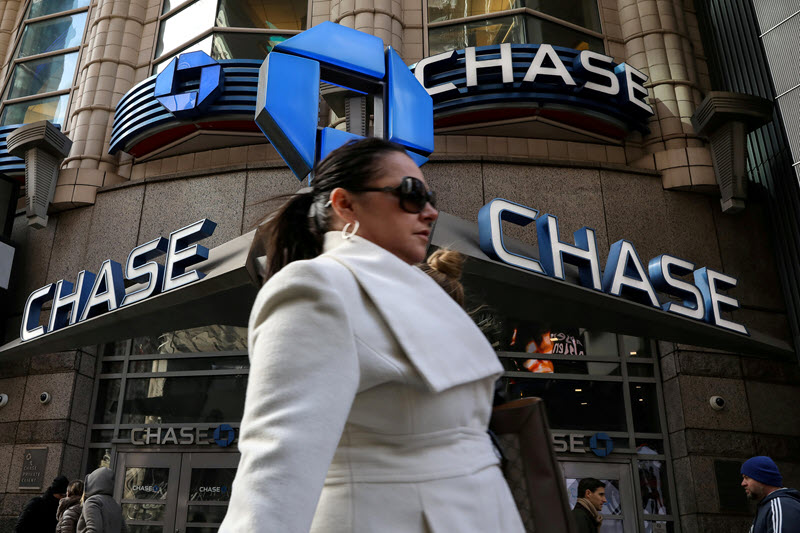© Reuters. FILE PHOTO: JPMorgan Chase Bank is seen in New York City, U.S., March 21, 2023. REUTERS/Caitlin Ochs
By Nupur Anand, Lananh Nguyen and Mehnaz Yasmin
NEW YORK (Reuters) -JPMorgan Chase & Co’s CEO Jamie Dimon said he leads the largest U.S. bank with the same intensity as when he was younger, but noted with a laugh on Monday that he plans to remain another “3-1/2” years.
Dimon stressed the bank’s plans regarding his tenure were unchanged, although did not give specifics.
“I’m not going to change, I’m not going to play golf, I love my country, my company, my family,” said Dimon during the bank’s investor day. “I can’t do this forever, I know that, but my intensity is the same. When I don’t have this kind of intensity, I should leave.”
When asked at various points during his 17-year tenure about succession plans, Dimon, 67, had previously given five years as a timeline for stepping down. On Monday, he expressed confidence in the next generation of management and the board’s succession planning.
“One of the most important governance things is that once a year the board meets without the CEO,” Dimon said. “If you want to give a board discretion and ability to talk to each other, it’s not to have me in the room.”
Succession plans of Wall Street giants have come into focus after Morgan Stanley (NYSE:) chief James Gorman signaled last week he would hand over the reins within 12 months.
President and Chief Operating Officer Daniel Pinto is one leader who could eventually succeed Dimon. He was identified “as a key executive who is immediately ready to step into the role of sole CEO, should the need arise in the near-term,” a previous company filing said.
At the investor day, the lender said its net interest income will rise $3 billion as interest payments increase from its purchase of failed First Republic Bank (OTC:) this month.
Net interest income will rise to $84 billion from higher interest payments in 2023, JPMorgan (NYSE:) estimated, increasing an earlier forecast of $81 billion, due to First Republic which was shuttered by authorities this month.
Integration costs from the deal will add $3.5 billion to its 2023 expenses, adding to an earlier forecast of $81 billion. The Wall Street giant is integrating the regional lender, a process that will likely take about 12 months.
“We continue to be very optimistic that this acquisition will help us to accelerate our affluent strategy, but integrations are hard,” said Marianne Lake, JPMorgan’s co-CEO of consumer and community banking.
JPMorgan has emerged as one of the biggest beneficiaries of the recent banking crisis due to an influx of deposits from customers seeking safety in larger institutions.
First Republic was the third U.S. regional lender to fail since March in a sector-wide upheaval that roiled financial stocks, deepened worries of a crisis and pressured mid-sized banks at a time when investors already feared a looming recession.
“We cannot ignore that there are plenty of challenges at this time and sources of uncertainty,” said Pinto.
While the global and U.S. economies are doing fine, there are signs of deterioration as consumers erode their savings buffers, interest rates rise and inflation remains persistent, Pinto added.
“Everyone should be prepared for rates going higher from here,” Dimon said. “Five percent’s not high enough for Fed Funds – I’ve been advising this to clients, and banks, you should be prepared for six, seven.”
The Fed funds target rate stands in the 5%-5.25% range, following 500 basis points of hikes since March 2022.
JPMorgan’s revenues for investment banking and trading are both expected to decline 15% in the second quarter, Pinto said, predicting increased market volatility as central banks approach the end of their monetary tightening cycles.
Still, JPMorgan plans to increase its investment expenses to $15.7 billion in 2023 from $13.7 billion last year.
The bank’s shares fell 0.8%.
JPMorgan also restated its 17% target for return on tangible common equity, a key measure of how well a bank uses shareholder money to produce profit.
The lender plans to modestly increase its branch footprint, said Jennifer Roberts, its CEO of consumer banking. It serves nearly 80 million customers and 5.7 million small businesses and is the first bank with operations all of the contiguous 48 U.S. states.
Wells Fargo (NYSE:) analysts led by Mike Mayo said the bank’s presentation reflects the “Goliath is winning” theme.
“The slides reflect benefits of scale,” the brokerage said in a note.
Read the full article here


